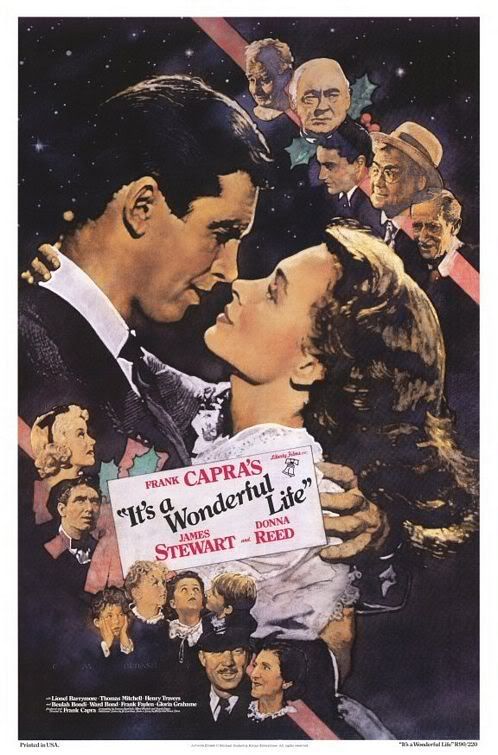
I'm not exactly sure when it was that I realized It's A Wonderful Life is my all-time favorite movie (Christmas or not). For a long time I thought it was too difficult to make such a distinction and--to be completely honest--Casablanca jockeys for the spot when it's not the Christmas season.
But there's really no contest.
I saw the film three times in the past few weeks and also attended a wonderful (tee hee!) 1940s-style radio play adaptation performed by the American Theater Company. I have the movie memorized to the point that I was talking along with it on the Christmas Eve TV broadcast and annoying my family with my fun new habit of quoting IAWL movie lines at appropriate times in daily life and conversation. On top of all that, I would gladly watch it again right now. There is no such thing as getting sick of this movie and I swear I don't need a CAT scan.
So why do I love it so much? Well, let me first state my firm belief that despite having a happy ending and being directed by Frank Capra, the movie is not a sickeningly sweet piece of "Capracorn" as so many critics have claimed. The first half hour alone deals with issues of alcoholism, child abuse, death and financial insecurity. What is "feel-good" about any of those topics?
I would argue that IAWL is actually a very realistic portrayal of the ups and downs of human life. Although it's just a bit over two hours long, the film seems a lot longer. Thanks to excellent pacing, the ensemble cast and the astounding acting of Jimmy Stewart, I feel like I'm getting to know every aspect of George Bailey and the inhabitants of Bedford Falls. This obviously makes the ending even more effective, but not overly schmaltzy. I seem to tear up earlier and earlier every time I watch the movie and it's because the plot is so engaging and the characters are so true-to-life--not because Frank Capra tied everything up into a happy bow in the final scene.
As the movie rolls on, you can feel George's frustration building and Potter's greed simmering. You can appreciate Clarence's innocence and Mary's love for her husband. When George enters his Clarence-induced alternate reality, I always find myself mentally expounding on the less obvious impact that George's life has had on the denizens of Bedford Falls/Pottersville. For example, cabdriver Ernie Bishop mentions that he is separated from his wife and kid. One can infer that George's work through the Building and Loan to help Ernie buy a house might have saved his marriage. Few other movies get me thinking this much.
And I'm not alone. Well aware of my affinity for the flick, several friends sent me a good New York Times article that sardonically reexamines several aspects of the film and raises a few valid-if-nit-picking points, but ultimately concludes that it is still a fantastic cinematic experience.
I'd actually love to hear from the haters. What are the grounds for disliking this movie? I defy anyone with half a heart to watch it and not get choked up when Harry Bailey raises a toast in the final scene and says, "To my big brother George, the richest man in town."
We are all George Bailey and the movie lets us empathize with his emotional baggage, even if Mr. Gower didn't buy us a big suitcase to keep it in. Maybe that's why the ending is too sweet for some people. Whatever they're going through, they can't see anyone raising the toast for them and they're still stuck on the bridge in the snow, waiting for salvation from Clarence. Well, for me, the movie serves as an annual reminder to get off my metaphorical bridge and appreciate the little things I couldn't see before that make life so wonderful. It's a pretty great way to start the new year.

1 comment:
Dear Matt,
Nice post! My name is Peter Ricci, and I'm a college student and journalist who currently contributes to 'Too Shy to Stop,' an online magazine focused on culture and the arts.
I came across your post, as it would turn out, while searching for different blogs on "It's a Wonderful Life," as I just finished an essay on the film.
While a wonderful film, I take an alternate view, seeing it as a populist message in cue with Capra's career and its current status as a holiday chestnut a gross misinterpretation.
Check it out! I think you will like it, and I would love a comment: http://tooshytostop.wordpress.com/2008/12/24/its-a-wonderful-life-wonderfully-misinterpreted/
Sincerely,
Peter Ricci
Post a Comment